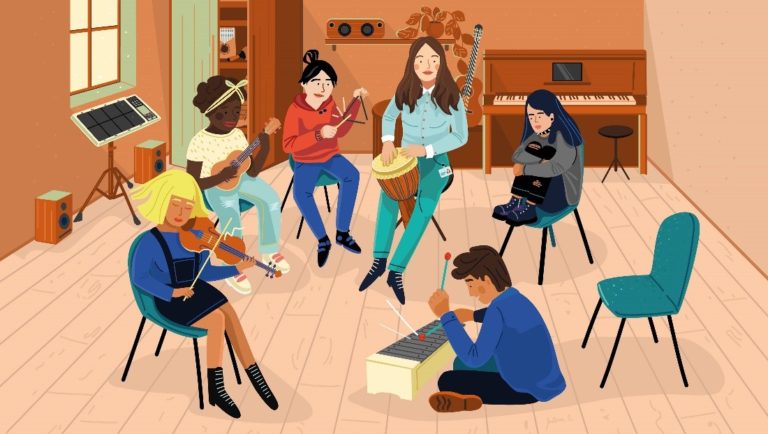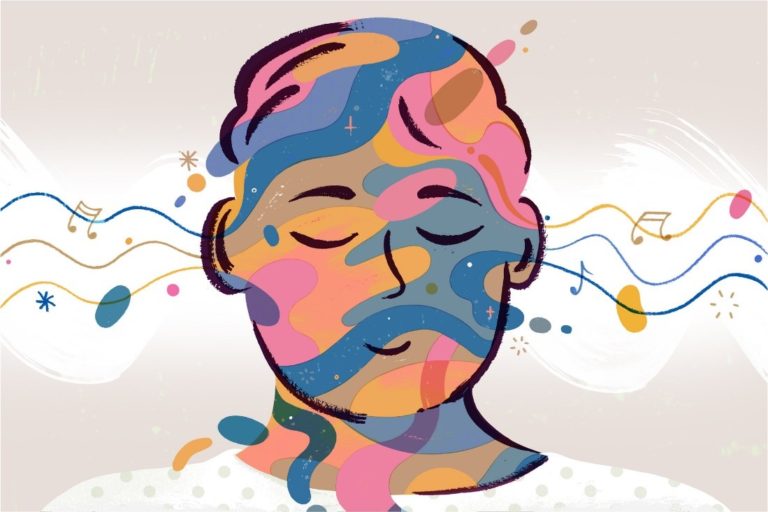Creative Series Part Two: Music Therapy
By Maisha Ahmed

NY Project Hope is a crisis counseling program that provides support and resources to help people cope with the challenges of the Covid-19 pandemic
In our previous blog, we talked about the essence of creative ways to de-stress with an emphasis on ‘art therapy’. This week we will be talking about ‘music therapy’. I know that more often than not, music is seen as a form of entertainment; however, music also has another purpose. Through its usage of rhythmic and repetitive patterns, it engages the neocortex of our brain which often calms us down and reduces impulsivity. That’s why it’s vital to be informed about how music plays a role in advocating for better mental health well-being as well as learning about the many benefits that it brings.
Music Therapy: A Brief Introduction and the Four Major Components
‘Music therapy’ involves the application of music to address physical, emotional, cognitive, and social challenges faced by individuals. It often intertwines various activities such as listening to melodies, playing instruments, writing songs, or even guided imagery. There is no age limit in terms of seeking music therapy or using music as a coping method; much like art therapy, there is no need to have an innate talent either. I remember when I used to play the violin and piano in middle school and it was my gateway from stress that a typical teenager goes through. Often times, the way I’d play the violin is similar to someone scratching their nails on the blackboard; nonetheless, it was pure enjoyment and a safe space that belong to me.
There are four major components to ‘music therapy’:
- Lyric Analysis-This method consists of allowing the individual to offer insight, alternative lyrics, tools, and themes that can be used to compare with their life experience. For example, after my father passed away, there is a song I listened to often (it is in a different language but the English translation is enough to capture the beauty of the lyrics) in which the singer talks about his love for his father. He wrote this song after his father passed away so in some sense, it gave me comfort as well.
- Improvisation Music Playing-The importance of playing instruments is that it paves the way for emotional expression and socialization. A wonderful example is creating a stormy sound through the use of drums and other percussive instruments to showcase feelings of escalation and de-escalation in relations to the feelings a person may be feeling. It’s sort of like when you’re upset or angry and you just clamp down hard while playing the piano.
- Active Music Listening-It’s well known that we often listen to music to match our mood. I tend to listen to mellow, sad songs when I’m sad but obviously it puts me in a more depressive state. That’s why it’s recommended to slowly shift the music into something more positive or calming.
- Songwriting-Just like journaling, songwriting gives individuals a chance to let out their inner thoughts and feelings through their lyrics. The process can be both validating and help boost self-esteem. To add onto this, I’d like to provide an example in which every Saturday, my coworker and I provide emotional support counseling to children and adolescents at an open community event. We met a man there who teaches a hip-hop class and allows these kids to make their own rap lyrics which helps them understand how to use music as a form of emotional outlet. I thought this was such an amazing opportunity and it truly opened my eyes to see how making music and writing songs can not only be entertaining but also helpful in terms of emotional strength and healing.
History of Music Therapy

But how and when did the discovery of music and its beneficial effects on a person’s psychological well-being occur? Well, one could say it officially started after the two World Wars when musicians would often go to hospitals and play for veterans suffering from physical injuries and emotional traumas. But technically, it dates back to 1789 when a magazine published an article titled “Music Physically Considered”. Then in the early 1800’s, two physicians wrote a dissertation on the relationship between music and using it as a treatment for diseases. Around 1940’s, music therapy began to form its root as legit method for therapeutic purposes as three key players, Ira Altshuler, Willem van de Walle, and E.Thayer continue to push for and introduce music theory in state facilities including universities. As the world starts to discover what music theory is all about, they also started to reap in the benefits of it.
Benefits of Music Therapy
- Improvement in cognitive, coordination, reading, comprehension and math skills
- Boost in mood and self-esteem
- Decreased anxiety
- Increased motivation
- Successful and safe emotional release
- Increased verbalization
- Social support
As always, Project Hope is also here to help you! Sometimes it can be helpful to talk to someone you don’t know! Want to know more about how we can help? Give us a call at 845-762-2275. Talking to us is always free, anonymous, and confidential.
Maisha Ahmed is a crisis counselor from Independent Living, Inc. working on with the NY Project Hope program.
References:
https://www.medicalnewstoday.com/articles/music-therapy#benefits
https://www.musictherapy.org/about/history/
https://www.nami.org/Blogs/NAMI-Blog/December-2016/The-Impact-of-Music-Therapy-on-Mental-Health
https://www.takingcharge.csh.umn.edu/common-questions/what-music-therapy

